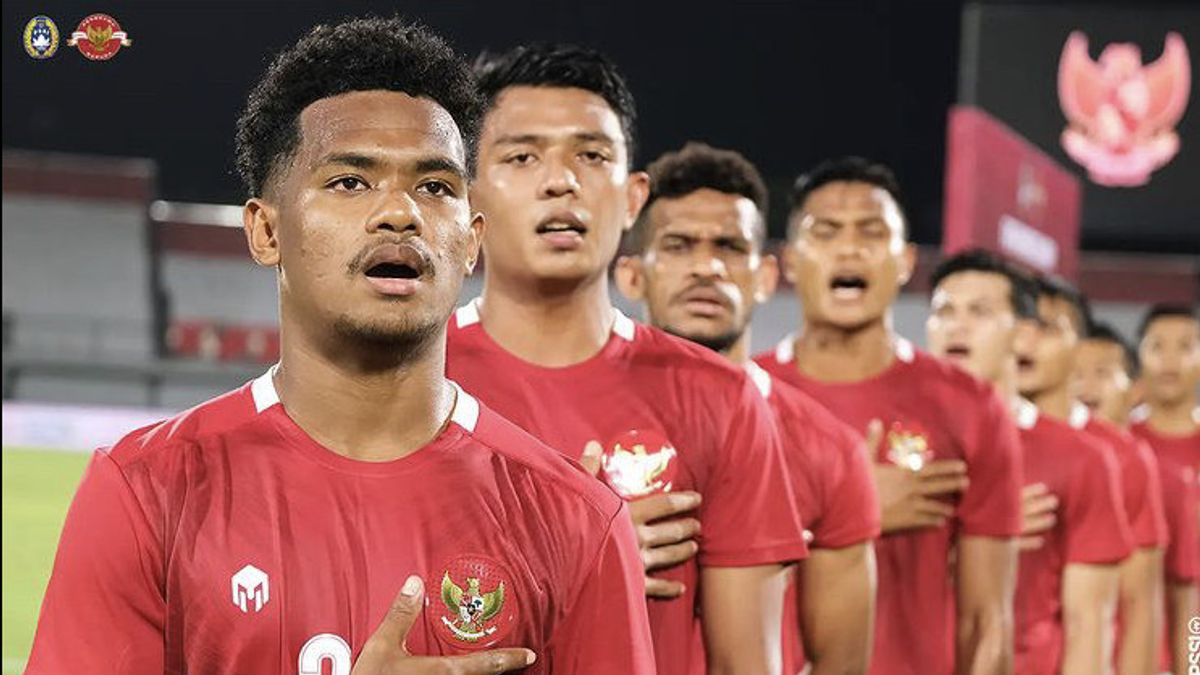
Garuda’s Ascent: Decoding Indonesia’s Latest FIFA Ranking and Its Grand Ambitions
The FIFA World Ranking, a system designed to objectively compare the strength of national football teams, is more than just a number. It’s a barometer of a nation’s footballing health, a determinant for crucial tournament seedings, and a significant source of pride (or sometimes, despair) for fans. For Indonesia, a nation where football is a religion, the fluctuations in the FIFA ranking are watched with bated breath, often dictating the national mood. In recent times, the trajectory of the Indonesian national team, affectionately known as “Garuda,” has been one of promising ascent, reflecting a concerted effort to climb back to relevance on the Asian and global stages.
As of the latest FIFA ranking update in June 2024, Indonesia stands at 134th position in the world. While this might not sound like a top-tier ranking, it represents a significant improvement from its historical lows and a consistent upward trend that has ignited hope and enthusiasm across the archipelago. To truly appreciate this position, one must delve into Indonesia’s tumultuous footballing history, understand the mechanics of the FIFA ranking system, and analyze the strategic shifts that have propelled the Garuda forward.
The Latest Snapshot: A Number with Meaning
The 134th spot places Indonesia among the rapidly improving nations in Asia. Within Southeast Asia, it positions them competitively, often vying with regional rivals like Malaysia, Singapore, and the Philippines, while still looking up to powerhouses like Vietnam and Thailand. This current ranking is a testament to recent positive results in critical matches, particularly within the 2026 FIFA World Cup Qualifiers and the 2023 AFC Asian Cup. Each point gained, each position climbed, is a step closer to achieving long-held national footballing dreams.
The Mechanics Behind the Ranking: Understanding the Elo System
The FIFA ranking system, based on an Elo-rating method, is a complex but logical algorithm designed to reward performance, consistency, and the strength of opponents. Key factors influencing a team’s points include:
- Match Result: Winning a match earns more points than a draw, and a draw earns more than a loss.
- Match Importance (I): Different types of matches carry different weights.
- Friendlies: Least important.
- FIFA World Cup Qualifiers/Confederation Qualifiers (e.g., Asian Cup Qualifiers): Moderately important.
- Confederation Finals (e.g., AFC Asian Cup): Highly important.
- FIFA World Cup Finals: Most important.
- Opponent Strength (WA): Beating a higher-ranked team yields more points than beating a lower-ranked one. This encourages teams to play stronger opponents.
- Result Weighting (W): A win (W=1), a draw (W=0.5), or a loss (W=0).
- Expected Result (We): This is calculated based on the difference in ranking points between the two teams. If a team beats a higher-ranked opponent, their actual result (W) is much better than their expected result (We), leading to a significant point gain. Conversely, losing to a much lower-ranked team results in a substantial point loss.
The formula is P = Pbefore + I * (W – We), where P is the new points total, Pbefore is the points before the match. This system emphasizes that consistent victories against strong opposition in important tournaments are the fastest way to climb the ranks.
Indonesia’s Tumultuous Journey: From Peaks to Troughs
Indonesia’s footballing history is a rollercoaster of exhilarating highs and frustrating lows. The nation reached its highest-ever FIFA ranking of 76th in September 1998, a period when Indonesian football was relatively strong in Southeast Asia, with a competitive domestic league and a talent pool that produced exciting players. However, this golden era was fleeting.
The subsequent two decades saw a gradual decline, exacerbated by various factors:
- Internal Conflicts: Disagreements and power struggles within the football federation (PSSI) often led to instability, poor management, and a lack of long-term strategic planning.
- Sanctions: In 2015, FIFA controversially suspended Indonesia from international football due to government interference in the PSSI, leading to a complete cessation of international matches. This period was devastating, causing the ranking to plummet to its lowest point: 191st in August 2016.
- Lack of Professionalism: Inconsistent league standards, inadequate infrastructure, and a less-than-optimal youth development system hindered the progress of promising talents.
- Tactical Deficiencies: Often, teams lacked tactical discipline, modern coaching methods, and physical conditioning comparable to top Asian nations.
The road back from 191st has been arduous, marked by a slow and steady rebuilding process.
The Shin Tae-yong Era: A Catalyst for Change
A pivotal turning point for Indonesian football arrived with the appointment of South Korean coach Shin Tae-yong in late 2019. Known for his tactical acumen and experience coaching the South Korean national team at the 2018 World Cup, Shin was tasked with a monumental challenge: transforming a dispirited team with a history of underperformance.
Shin’s impact has been multifaceted:
- Discipline and Professionalism: He instilled a rigorous training regimen, emphasizing physical conditioning, tactical discipline, and a professional mindset previously lacking. Players are now expected to adhere to strict diets and training protocols.
- Youth Movement: Shin bravely integrated young talents into the senior squad, providing them with invaluable international exposure. Players like Marselino Ferdinan, Pratama Arhan, Rizky Ridho, and Witan Sulaeman have flourished under his guidance, becoming integral parts of the team.
- Naturalization Program: Perhaps the most impactful strategic decision under Shin’s tenure, in collaboration with the PSSI, has been the aggressive pursuit of naturalizing players of Indonesian descent playing in European leagues. This program has brought in a new dimension of quality, experience, and tactical intelligence. Players like Jordi Amat, Sandy Walsh, Marc Klok, Ivar Jenner, Rafael Struick, Justin Hubner, Jay Idzes, Nathan Tjoe-A-On, Ragnar Oratmangoen, and Thom Haye have significantly elevated the squad’s technical and physical capabilities, allowing Indonesia to compete on a more equal footing with stronger Asian opponents.
- Key Performances:
- AFF Championship 2020 (played in 2021): Indonesia reached the final, showcasing a vibrant, attacking style of play, hinting at the potential of the young squad.
- 2023 AFC Asian Cup Qualification: Indonesia successfully qualified for the Asian Cup for the first time in 16 years (excluding their host nation appearance in 2007), a significant milestone.
- 2023 AFC Asian Cup Finals: Against all odds, Indonesia advanced to the knockout stages (Round of 16) for the first time in their history, despite being drawn in a “group of death” with Japan, Iraq, and Vietnam. Their victory against Vietnam was particularly crucial for their ranking.
- 2026 FIFA World Cup Qualifiers (Round 2): Indonesia’s impressive run saw them defeat Vietnam twice (home and away) and draw against the Philippines, securing their place in Round 3 of the qualifiers. This achievement is monumental, placing them among the top 18 teams in Asia and ensuring more competitive matches against elite opponents.
These results, especially the victories against higher-ranked teams like Vietnam and their strong showing in the Asian Cup, have been instrumental in their steady climb up the FIFA ladder.
Impact of an Improving Ranking: Beyond Just a Number
An improved FIFA ranking brings a multitude of benefits that extend beyond mere bragging rights:
- Tournament Seedings: This is perhaps the most critical practical advantage. A higher ranking means a better chance of being placed in a higher pot during tournament draws (e.g., World Cup Qualifiers, Asian Cup). This can lead to an “easier” group, increasing the chances of progression. Indonesia’s improved ranking certainly aided their qualification prospects for the Asian Cup and their progression to Round 3 of the World Cup Qualifiers.
- International Perception and Friendlies: Higher-ranked teams are more likely to attract interest from stronger nations for international friendlies, providing invaluable experience against top-tier opposition and further opportunities to gain ranking points.
- Fan Morale and Sponsorship: A rising ranking fuels national pride, boosts fan engagement, and attracts more corporate sponsorships, injecting much-needed funds into the football ecosystem. The current enthusiasm around the national team is palpable, leading to sold-out stadiums and increased media attention.
- Player Development: Playing more competitive matches against higher-ranked opponents forces players to elevate their game, contributing to their individual and collective development. It also makes Indonesian players more attractive to foreign clubs.
Challenges and Opportunities on the Horizon
Despite the promising trajectory, the road ahead is fraught with challenges, but also ripe with opportunities:
Challenges:
- Consistency: Maintaining the current momentum against stronger opponents in Round 3 of the World Cup Qualifiers will be a huge test. The gap between Indonesia and Asia’s elite (Japan, South Korea, Iran, Australia, Saudi Arabia) is still significant.
- Squad Depth: While the naturalization program has brought in quality, ensuring sufficient depth across all positions and preparing for injuries or suspensions remains crucial.
- Domestic League Quality (Liga 1): The local league needs to consistently produce high-quality players and maintain professional standards to feed the national team. Issues like inconsistent refereeing, poor infrastructure, and match-fixing allegations need to be addressed.
- Youth Development: While Shin has utilized young players, a sustainable, long-term youth development strategy across the country is essential to continuously produce home-grown talents, rather than solely relying on naturalization.
- Tactical Evolution: Opponents will increasingly study Indonesia’s tactics. The coaching staff needs to continuously evolve their strategies to stay unpredictable and effective.
Opportunities:
- Leveraging Naturalized Players: These players bring a wealth of experience from top European leagues, serving as mentors for local talents and raising the overall standard of play.
- Continued PSSI Reforms: Under new leadership, the PSSI has shown a commitment to professionalism and strategic planning. Sustaining these reforms is vital.
- Building on Success: The Asian Cup and World Cup Qualifiers successes provide a strong foundation. This momentum can be used to inspire more investment and participation at grassroots levels.
- Aiming for Asian Cup 2027: Consistent performance in Round 3 of the World Cup Qualifiers will also serve as a pathway for direct qualification to the 2027 AFC Asian Cup, further solidifying Indonesia’s place among Asia’s top teams.
The Road Ahead: Sustaining the Momentum
Indonesia’s immediate focus lies on the upcoming crucial matches in Round 3 of the 2026 FIFA World Cup Qualifiers. Competing against continental giants will be an immense challenge, but also an unparalleled opportunity to gain experience, points, and prove their mettle. The goal isn’t just to qualify for the World Cup (a daunting task for any Asian nation), but to consistently challenge for spots in the Asian Cup and establish themselves as a perennial top-10 to top-15 team in Asia.
The current FIFA ranking of 134th is a symbol of hope and progress for Indonesian football. It signifies a team that is rediscovering its identity, embracing modern footballing principles, and daring to dream big. With a passionate fanbase, a committed coach, a blend of exciting young local talents and experienced naturalized players, and a federation striving for professionalism, the Garuda is truly taking flight. The journey is far from over, but the current trajectory suggests that Indonesian football is finally on the right path, ready to soar to new heights.



